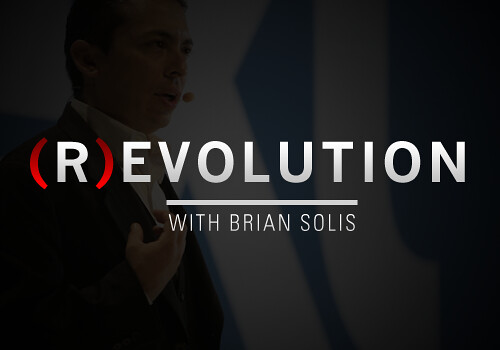
Today marks the debut of the second episode of (R)evolution, a new series that connects you to the people, trends, and ideas defining the future of business, marketing, and media.
Please welcome author, TV personality, TechCrunch blogger, and business journalist Sarah Lacy…
Living in Silicon Valley, tech startups and industry giants serve as common fixtures, much in the same way movie studios and production companies adorn Hollywood. Twitter, Facebook, and YouTube are on the minds and in the conversations of leaders and entrepreneurs. And, they’re also factored into the business strategies of today and tomorrow.
Certainly tech innovation is not relegated to Silicon Valley. New York, Boulder, Portland, Chicago, Los Angeles, DC, et al, are incubating some of the hottest startups. Sarah Lacy set out on an exhausting adventure to show us a different side of entrepreneurialism.
In her new book, Brilliant, Crazy, Cocky: How the Top 1% of Entrepreneurs Profit from Global Chaos,
Lacy spanned the globe, from towns to small villages to big cities, to surface the incredible stories of entrepreneurs who are trying to change the world they know. In her book, she shares with us the stories that not only celebrate global innovation, but also inspire us to feel and think about the very human needs of everyday people, here, there, and everywhere.
Credits:
Andrew Landini, Producer
Adam Eckenfelder, Audio Tech/Re-Recording Mixing
Location: Portabello Grill, Redwood City
Past Episodes:
Episode One: Empowered with Josh Bernoff
Transcript
Brian: Hello and welcome back to another episode here at Brian Solis.com. I have with me one very special guest, who is actually someone I am honored to call a very good friend, Sarah Lacey.
Sarah, from among many reasons, and of course there has to be that one timely element, and that is that you have a book coming out this January 2011.
Sarah: So it is called, Brilliant, Crazy, Cocky: How the Top 1% of Entrepreneurs Profit from Global Chaos.
Brian: So it wasn’t just about the travel, though. In many ways, and I probably haven’t said this aloud to her, is in my eyes you became sort of this technology anthropologist, where you were basically immersing yourself in not just cultures, but the very specific culture of entrepreneurship within each one of these countries, which is, judging by these stories, obviously a little bit different than the Silicon Valley. And it wasn’t just anthropology, however, though, you did other types of research. I think you had mentioned you read over forty books.
Sarah: I very quickly knew that I had to get up to speed. I was also taking like Mandarin and Orange…it is ridiculous.
Brian: There are other stories that I am sure will come out, probably not here, that would blow your mind. I don’t want to call it the hypocrisy, but I definitely want to put sort of like a real lens that you put on sort of global entrepreneurs, and that is if you talk about start-ups in the Silicon Valley, New York, certain folder, there seems to be a geek sheik that goes along with it. That is part of the style. It is sort of a lifestyle as well.
Sarah: These are involved.
Brian: Plus one. Would you say that impression is pervasive around the world?
Sarah: What is interesting is I think it runs along two tracks. There is always the people in the fashionable. So, in India is all like kids in Bangalore. And Brazil it is kids in Rio or Sao Paulo. And there is obviously Beijing and Shanghai. In China, there are these really glamorous centers where people probably read TechCrunch for too much, and think…
Brian: Or not at all.
Sarah: No, they do. They read this view of everyone just runs around and gets funding and you put something up and the next day it is acquired. And like, as the media, we have over simplified how things work. And Silicon Valley, to a detriment. So a lot of these kids, they are like, well, I heard this, Bangalore was the worst for this. I heard this over and over again, kids saying, I am going to quit my multinational job for a year and I am going to do the sites like Facebook, but better, and then if I don’t sell it in a year, then I will just go back to another job. That is not how you build a company. And so they are exporting in a lot of ways the worst parts of Silicon Valley, the reason I left Silicon Valley and started traveling to other markets. So that is why my approach to reporting was, I very early in the process stopped announcing when I would go to countries on TechCrunch, I stop doing any kind of TechCrunch meet-ups. I stopped, a lot of times, even announcing on Twitter I was going to a country, because I felt like, and I stopped making a schedule before I went there, because I felt like any one who knew who I was and knew how to reach out to me was just aiming for that glamorous geek sheik lifestyle and they weren’t really building a business.
Brian: This book is almost like a three hundred page field report around, country by country, and the entrepreneurs are sort of fueling this new economy.
Sarah: But the thing is, like when you find those real entrepreneurs, like one of my favorite ones in the book is a guy in Rwanda, who is a genocide survivor, who started this amazing consumer package good empire that was basically started with making rolls of toilet paper. You could say, one of the least high tech things, but the way he approaches business and the way he thinks about business and the way he thinks about marketing and the way he has beat competitors, having that conversation with him, his mind is working in the same way that like Mark ____ mind works, or Tony Hsieh’s mind works. The really great entrepreneurs of the Silicon Valley. So, as much as I was irritated by this kind of trying to rip off the shortcut culture of Silicon Valley, I was really inspired by people who don’t know any of these guys, but their mind works in the same way as great entrepreneurs here. So, I do think that there is something universal about the bad parts of it, and universal about the great parts of Silicon Valley as well.
Brian: So that is actually, that brings me up to the next question. A little while ago we had dinner, and I asked you a question about…
Sarah: Because it is seven o’clock.
Brian: Exactly. Whether or not entrepreneurs in other countries had this ambition to sort of export what they were doing to Silicon Valley? Or if just having an impact in their own economy was more than enough for them. And, your answers somewhat surprised me. And so, why don’t you share a little bit with everyone else.
Sarah: Whether what I will say now is the same thing I said at dinner. I mean, this might be a self selection thing. Because I really sought out people building things for the domestic economy. And people building things for these huge chaotic transforming worlds that they were in. And I think great entrepreneurs, they want to make their world better. Not as the world, but their world better.
Brian: One of the things that I find fascinating about the topic of the book, well actually many things, but one in particular, is if you live here, and you read about the world of Web 2.0 start-ups, the glamour of what it is that – let’s just look at the front runners today, Facebook and Twitter and foursquare. You get a very different idea of what really is driving this new economy, especially if you go around the world. How much of this what you saw is social, and how much of this is mobile, and how is what you saw sort of changing the way or the dynamics of people sort of communicate and share with one another?
Sarah: Part of what is amazing to me is the way like agriculture, education, basic, fundamental stodgy old world parts of our economy are being remade completely in new, whether it is using computers, whether it is using Twitter, whether it is using SMS is the biggest phenomenon in the emerging world, as they have mobile phones and have toilets in the emerging world. The role that SMS plays in these people’s lives is phenomenal. We obsess about the iPhone here. We are missing the story.
Brian: Or we might obsess also about AT&T, but that is a different story. So, with that, Sarah, thank you very much for joining us here on a beautiful day in Redwood City at Portabella Grill. Again, one more time with the book, and when it will be available.
Sarah: It is coming out in January, but I believe you can preorder it now on Amazon. And it is called Brilliant, Crazy, Cocky: How the Top 1% of Entrepreneurs Profit from Global Chaos.
Connect with Brian Solis on Twitter, LinkedIn, Tumblr, Facebook
___
Please consider reading, Engage!: It will help you find answers to your questions…

___
Get Putting the Public Back in Public Relations and The Conversation Prism:







Brian-
Like this new feature. Nice format and informal feel. You come away with a good feel for the guest. Thumbs up…lwf
Thank you Lee…appreciate it.